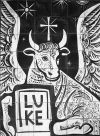
The Gospel of Luke
Peace and Division: Lk 12,49-53
The previous section ended with "much will be required of the person entrusted with much, and still more will be demanded of the person entrusted with more" (12,48). These verses explore further just what that means for Jesus himself.
The three sayings from Jesus begin: "I came" (verse 49), "I have a baptism" (verse 50, altered by the NAB) and "I have come" (verse 51, leading into verses 52 and 53).
Elijah called down fire from heaven who approached wrongly in 2 Kings 1. In a smilar way, the disciples in 9,54 wanted to bring down fire on the Samaritan villagers who opposed Jesus. Fire is both a symbol of judgement and of purification.The baptism of Jesus will be his passion in Jerusalem (13,33), his exodus (9,31) which is his destiny.
The consequences of this for his followers are made clear in verses 51-53. If Jesus has to suffer, so too will his disciples (9,23). Jesus may have been born to bring peace to those of good will (2,14) but Simeon soon pointed out Jesus' destiny (2,34-35). A call to decision is seen as a call which will divide, as we can see in Micah 7,6. That is the message of the cross.
We return now to the main page.
The Sunday Gospel
Jesus' reflection in the Gospel shows him in a buoyant mood as he seeks to fulfill his destiny.
Jeremiah is in a rather different situation as he is rejected and thrown into the cistern, a pit. The pit is a common image in the psalms for those isolated and cut off from their fellows, as we hear in Psalm 39. This is more an anticipation of the fate of Jesus, the outcome of being controversial.
We return now to the main page.
